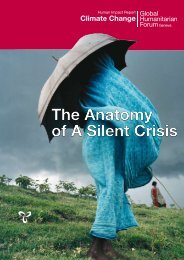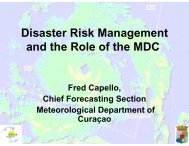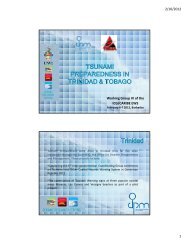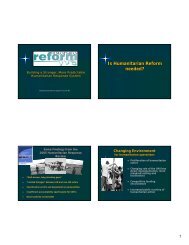Poverty Reduction Strategy Paper - UNDP Barbados and the OECS ...
Poverty Reduction Strategy Paper - UNDP Barbados and the OECS ...
Poverty Reduction Strategy Paper - UNDP Barbados and the OECS ...
You also want an ePaper? Increase the reach of your titles
YUMPU automatically turns print PDFs into web optimized ePapers that Google loves.
environmental health of <strong>the</strong> population. For <strong>the</strong> first time, <strong>the</strong> North Windward area –<br />
identified in <strong>the</strong> Kairi <strong>Poverty</strong> Assessment report, is having access to sanitation services.<br />
The Basic Needs Trust Fund (BNTF) Project is a regional programme sponsored by <strong>the</strong><br />
CDB <strong>and</strong> has been in operation for <strong>the</strong> past two decades. The objectives of <strong>the</strong><br />
programme include assisting low-income communities to improve <strong>the</strong>ir access to public<br />
services through <strong>the</strong> provision of social <strong>and</strong> economic infrastructure <strong>and</strong> <strong>the</strong> development<br />
of skills to enhance employability. To date its activities have included <strong>the</strong> provision of<br />
water systems, rural roads, drains <strong>and</strong> footpaths, schools, health facilities, market<br />
infrastructure, day care centres <strong>and</strong> skills training. The thrust of this work has been<br />
poverty-reduction, community development <strong>and</strong> empowerment. The BNTF project is<br />
housed in <strong>the</strong> Ministry of Transport Works <strong>and</strong> Housing.<br />
The National Insurance Scheme (NIS)<br />
The main purpose of this social security programme is to provide long-term benefits to<br />
assist persons after <strong>the</strong>y have retired. Its predecessor <strong>the</strong> National Provident Fund (NPF)<br />
was established in January 1970 by Act 1of 1970. The NIS commenced operations on<br />
January 5th 1987 by ACT number 33 of 1986.<br />
In most societies of <strong>the</strong> world, poverty is high on <strong>the</strong> social agenda. Consequently,<br />
governments <strong>and</strong> o<strong>the</strong>r social groups must grapple with <strong>the</strong> issue of poverty prevention.<br />
Part of <strong>the</strong> NIS' strategic thrust is "to administer our social security programme with a<br />
view towards alleviating poverty <strong>and</strong> increasing <strong>the</strong> st<strong>and</strong>ard of living in St. Vincent <strong>and</strong><br />
<strong>the</strong> Grenadines."<br />
One of <strong>the</strong> NIS’s social assistance programme is <strong>the</strong> Non-Contributory Assistance Age<br />
Pension (NAAP). This provides income to those elderly persons most in need. This<br />
programme provides cash benefits ($25.00 per week) to 1500 individuals who meet<br />
specific eligibility criteria associated with defined categories of need. Means tests are<br />
typically applied to <strong>the</strong> income <strong>and</strong> assets of individuals as a major condition of<br />
eligibility.<br />
Since 1995 <strong>the</strong> NIS has devoted some EC$ 7.1 million to Student Loans. This loan<br />
system is being phased out to <strong>the</strong> NCB. However, <strong>the</strong> NIS remains committed to<br />
complete service to those students previously enrolled in <strong>the</strong> Loan Scheme.<br />
Notwithst<strong>and</strong>ing evolving demographic structures, fluctuations in economic growth <strong>and</strong><br />
o<strong>the</strong>r macro economic developments, <strong>the</strong> NIS will continue to reassess its programmes<br />
with a view to offering greater assistance as need arises. The NIS fund is self-sustaining<br />
<strong>and</strong> has a varying portfolio of investments.<br />
3.7. Gender Equity<br />
Noting that poverty manifests itself in <strong>the</strong> forms listed following, <strong>the</strong> gender implications<br />
are obvious in that women <strong>and</strong> children are most vulnerable in <strong>the</strong>se areas:<br />
Final SVG I-PRSP Revision June 2003<br />
23







